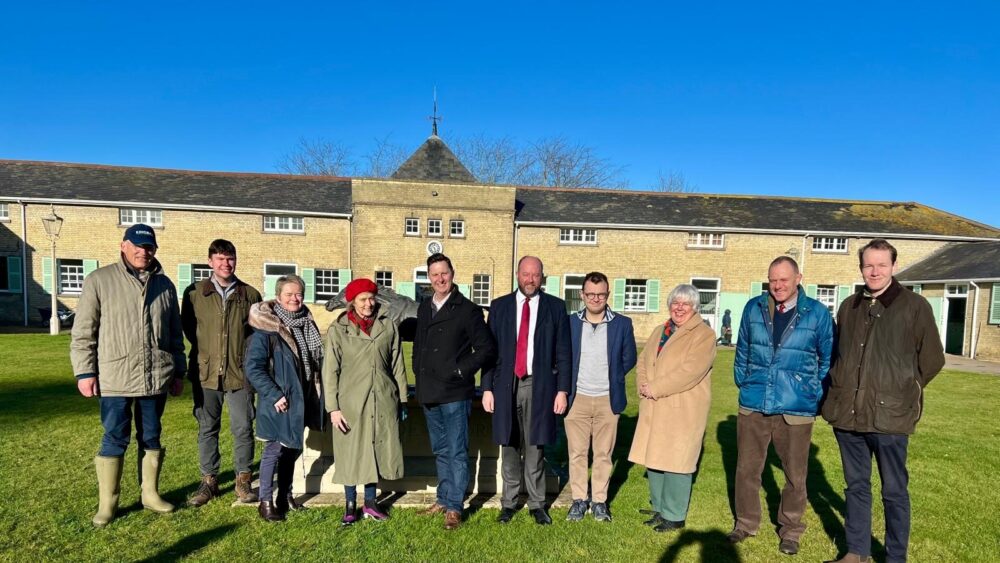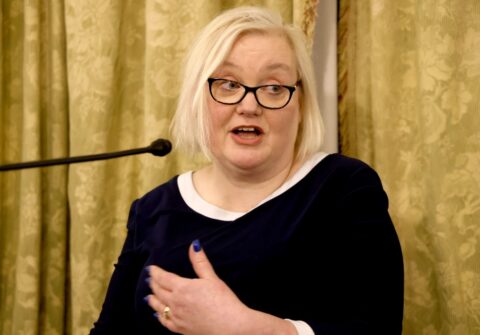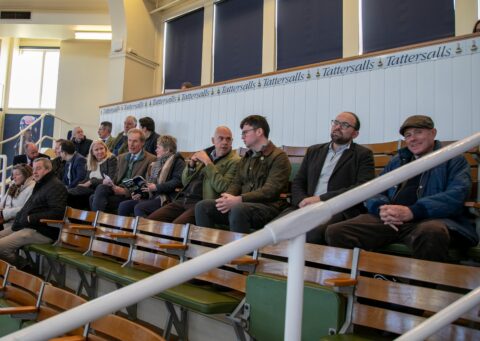Racing and Politics in 2025: A busy start to the year

By Jack Barton, BHA Policy & Advocacy Manager
The new year is always busy when it comes to political engagement and 2025 has been no exception.
Work on Levy reform, affordability checks and our wider political strategy has resumed at pace and our first event of the year on Monday 13 January brought key political and industry figures together for the first time in 2025. The recently re-formed All Party Parliamentary Group (APPG) for Racing and Bloodstock held a reception at the House of Commons, hosted by Co-Chair Dan Carden MP and sponsored by the BHA, the Jockey Club, Arena Racing Company and the Racecourse Association. More than 25 cross-party MPs and Peers attended at the event which was compèred by broadcaster Nick Luck.
Gambling Minister Baroness Twycross gave a speech where she said “British racing plays a crucial role as part of this country’s sporting culture and heritage,” as well as being “a major asset to this country, both domestically but also internationally.”

Baroness Fiona Twycross (Gambling Minister) speaks at APPG Reception
It is always nice to hear warm words, but decision making is where politicians can truly make the difference.
Joe Saumarez Smith, in his last public contribution in a distinguished career in British racing, spoke about the significant economic headwinds the sport is facing. He called for the Government to act on Levy reform and the impact of affordability checks on racing’s income, saying “almost two years after the previous Government published its White Paper on gambling, it is hard not to feel that repeated warnings from racing have not been taken seriously enough or the views of punters properly considered.”
It is a message that we will continue to relay to Government.
Dan Carden MP passionately relayed his love of racing and called on his Government to support the industry given the urgent need for Levy reform and for a better solution to be found on affordability.
He and the group’s other Co-Chair Nick Timothy MP have proactively asked questions and contributed to debates in Parliament on behalf of horseracing. A recent question from Nick at DEFRA Questions in the House of Commons on the designation of thoroughbreds as “high health” horses for the purpose of the Border Target Operating Model has provided clarity on the timeframes involved – a prime example of why lobbying politicians and building good relationships is so important.
They also helped us arrange an APPG visit to Newmarket on Thursday 30 January, which was attended by Nick and Dan, Jack Rankin MP (Con, Ascot and Windsor), Charlotte Cane MP (Lib Dem, Ely and East Cambridgeshire), Lee Pitcher MP (Lab, Doncaster East and the Isle of Axholme), Baroness McIntosh, Baroness Harding and Lord Herbert.
The visit included a trip to John and Thady Gosden’s Clarehaven yard, the British Racing School, Tattersalls and The National Stud, where they met the legend that is Stradivarius.

APPG visit Tattersalls
It was an educational visit where the visitors were able to see first-hand how the ecosystem of British racing works, with Newmarket probably the best example of how our industry can form the bedrock of a community.
Further behind the scenes visits will take place throughout the year.
The APPG subsequently met in Parliament last week, where Acting BHA Chief Executive Brant Dunshea and Director of Communications and Corporate Affairs Greg Swift updated the group about some of the sport’s lobbying activity.
The Levy review and affordability checks
The Levy review continues. With the Betting and Gaming Council’s (BGC’s) current position leaving little room for negotiation, we have called on DCMS to make a determination. However, Baroness Twycross has insisted that both parties return to negotiations, to include developing a new ‘growth fund’ for British Racing, and we are hoping to make some progress in the coming weeks.
We will continue to work in good faith with all parties to deliver an outcome that works for British racing. With the 2023 Gambling White Paper outlining Levy reform as a vehicle for mitigating its negative impacts on racing, any “growth fund” should contain a meaningful and, most importantly, new financial contribution.
On affordability, we will soon meet senior DCMS officials to discuss what is happening around customer checks and restrictions in more detail. We have also been speaking with both the Gambling Commission and the BGC about the progress of the pilot of enhanced financial risk assessments (the GC’s recent blog on the pilot is here).
There is undoubtedly a crucial moment coming at the conclusion of the pilot: are these checks truly frictionless or not? Given that Ministers – both old and new – have said they would only be introduced if they are just that, we await that confirmation. The presentation of facts and data – not opinion – will be important. As we have previously warned, there is a lot at stake for British racing.
Westminster Hall debate on Gambling Harms
New Labour MP Alex Ballinger led a Westminster Hall debate on Gambling Harms last week. Having worked to brief our supporters beforehand, Dan Carden MP attended and outlined the need for racing to be protected, stating that the Government has an opportunity to shape the gambling landscape to the benefit of real-life sports and entertainment. Lib Dem Culture, Media and Sport spokesperson Max Wilkinson MP also relayed his support for Levy reform and the need for more sustainable funding to go back into racing from betting.
Shadow Gambling Minister Louie French MP warned of the damage to British racing that stems from Government inadvertently pursuing policy measures that drive the growth of the black market, stating that regulations that “push the cost of safe and legal betting to such a height that participants choose to exit the market” risk “undermining efforts to make gambling safer.” This is a message that resonates following an International Federation of Horseracing Authorities (IFHA) study published last week which showed significant growth in unlicensed betting activity.
Sports Minister Stephanie Peacock MP – responding as the Gambling Minister sits in the House of Lords – said that the Government is committed to taking forward the remaining measures from the White Paper and that it is important that further reforms are “proportionate, targeted and effective.”
She also warned there needs to be an “appropriate volume” of gambling adverts and said that “industry ownership of safer gambling messages in the long term is not sustainable in the long term.”
With financial risk checks currently being piloted and a statutory instrument now laid to pass the Statutory Levy into legislation, it appears that gambling sponsorship and advertising could be the next battleground. Given the importance of gambling advertising to racing, especially to our terrestrial television coverage on ITV, it is a debate that we will monitor closely and intervene in where necessary. We know from our colleagues in Ireland how challenging this issue can be.
Other debate participants recognised the clear difference between traditional gambling products like racing and more harmful products like online slots and FOBTs, a position that has also recently been adopted by the part-architects of affordability checks the Social Market Foundation think tank.
Several MPs called for further tightening of existing gambling regulations, and we have written to them explaining the negative impact this would have on British racing.
Budget impact
Another issue affecting the sport is the impact of October’s Budget on racing businesses, including changes to Employer National Insurance and the National Minimum Wage.
While the campaign against Inheritance Tax and property relief changes has been led by the farming lobby, we have discovered – working in conjunction with the Thoroughbred Breeders’ Association – that 1 in 5 studs farms will be impacted. We are making representations to HM Treasury on the impact of the policy on breeders and associated industries.
With key metrics such as foal crop numbers tracking in the wrong direction, we can ill afford anything that further disincentivises breeders from producing young Thoroughbred bloodstock, especially over Jumps. While the drama and affluence of the buoyant top end of the sales market is a brilliant trade success story for the United Kingdom, it perhaps draws eyes away from where the focus really needs to be.
To conclude, as my colleague Victoria noted in October, we are dealing with a new political reality and progress on racing-related issues has proved challenging so far, given the new Government’s desire to focus on manifesto commitments. However, we have already built a solid cross-party political support base to help achieve our aims – and we will develop this further in 2025. We will also continue to work with them to ensure that representations are being made into the heart of Government and that Ministers and officials are aware of how they can support the industry.
Racing has a positive story to tell as an economic, cultural and sporting asset, with a loyal fanbase, who continued to turn out in numbers in 2024 despite a challenging economic environment. At the reception, Baroness Twycross stated the Government wants British racing to “continue to thrive”. Helping us do so could just be a vote winner too.
